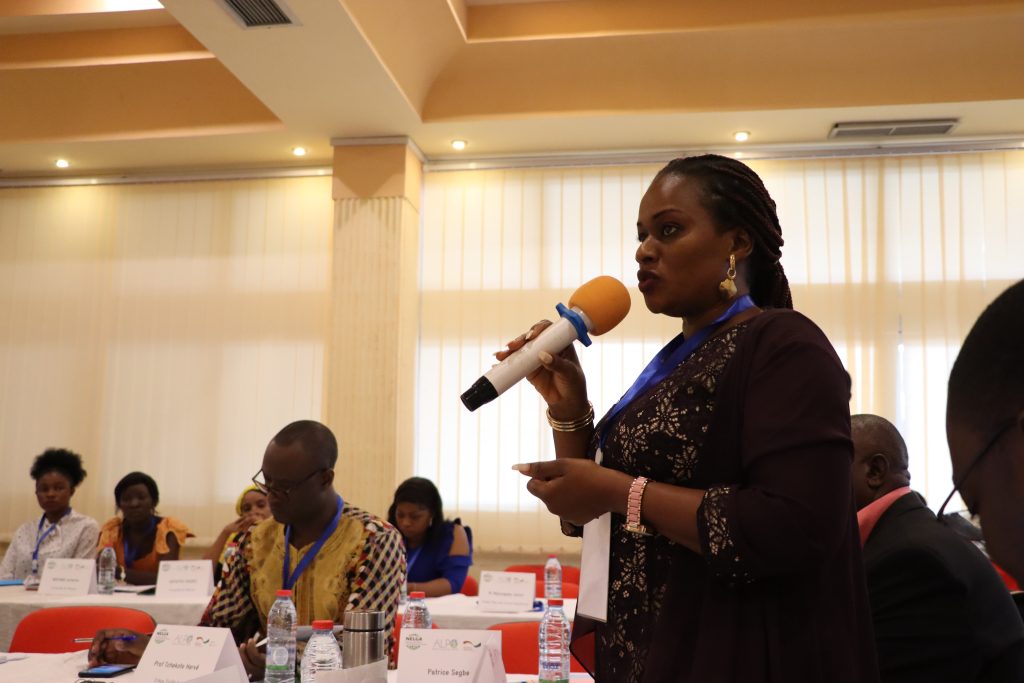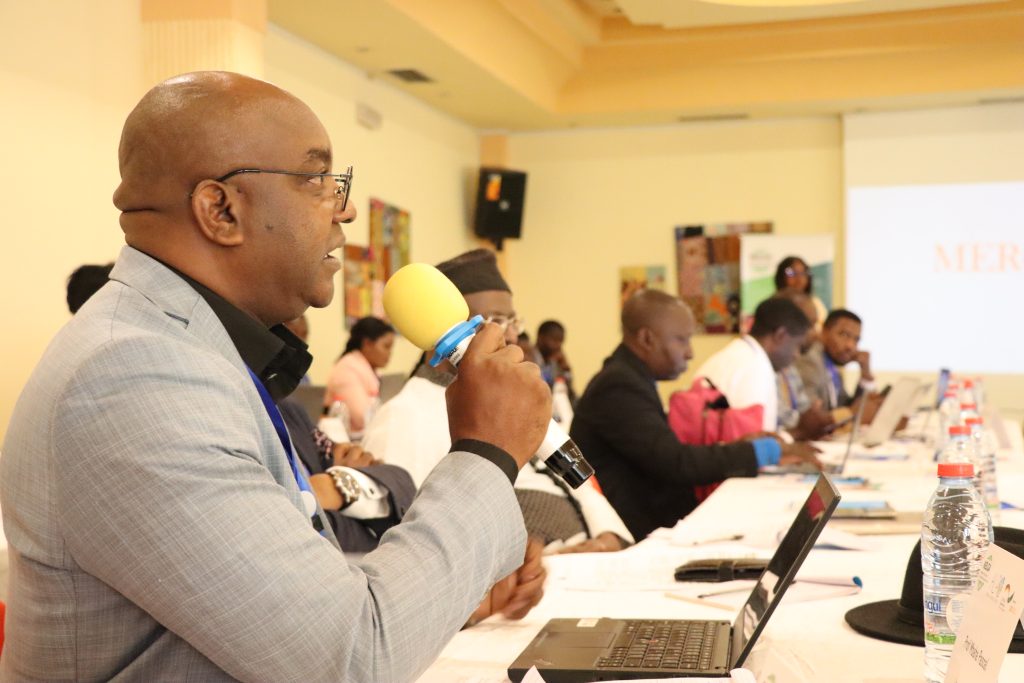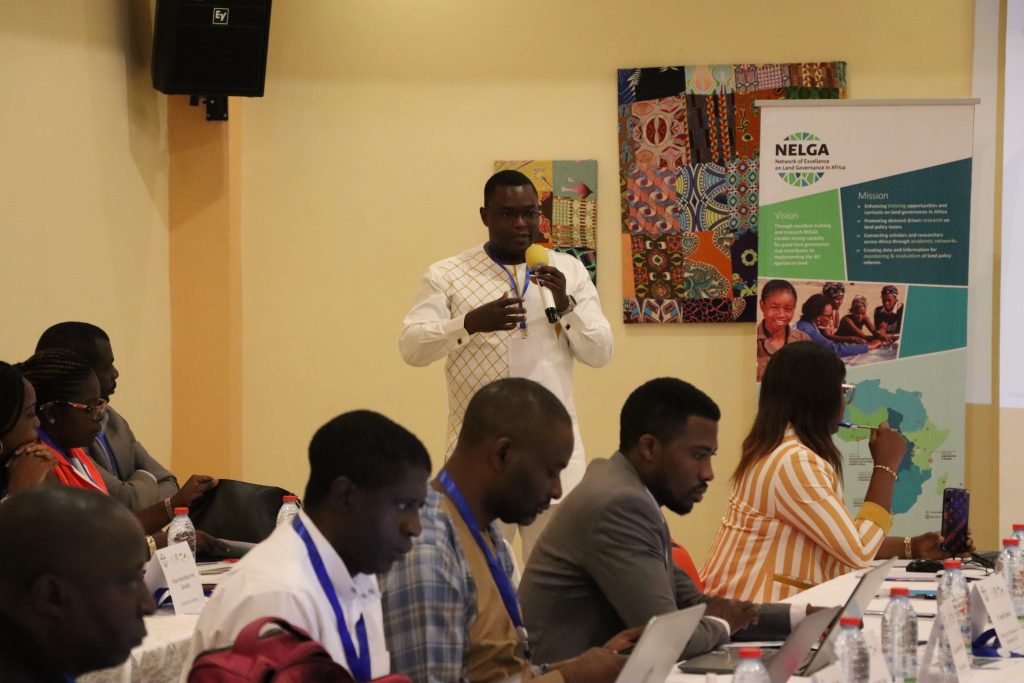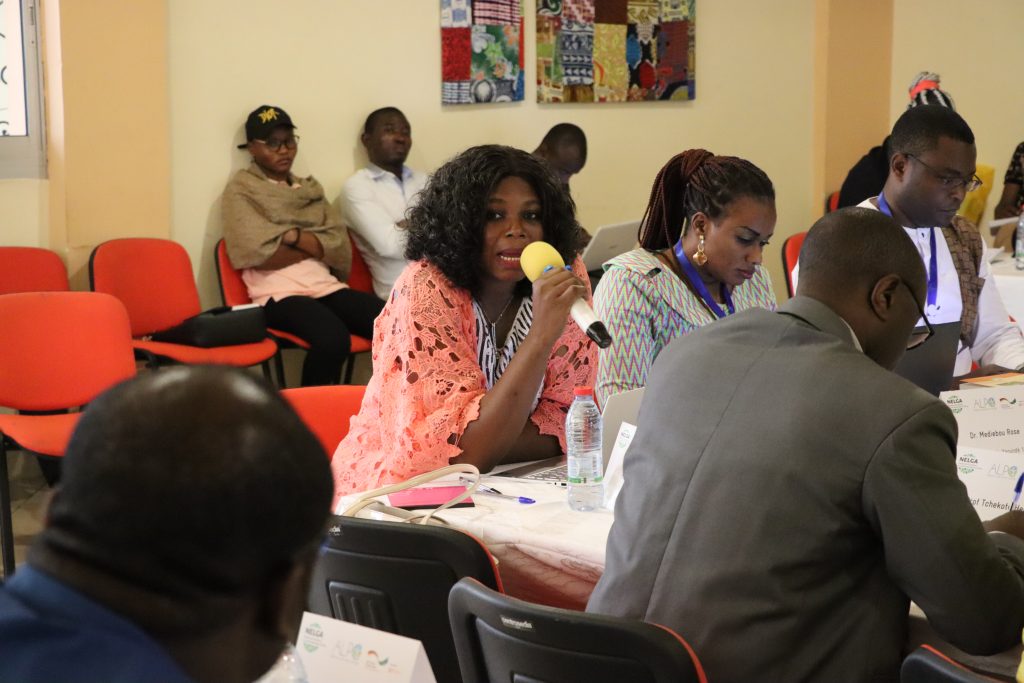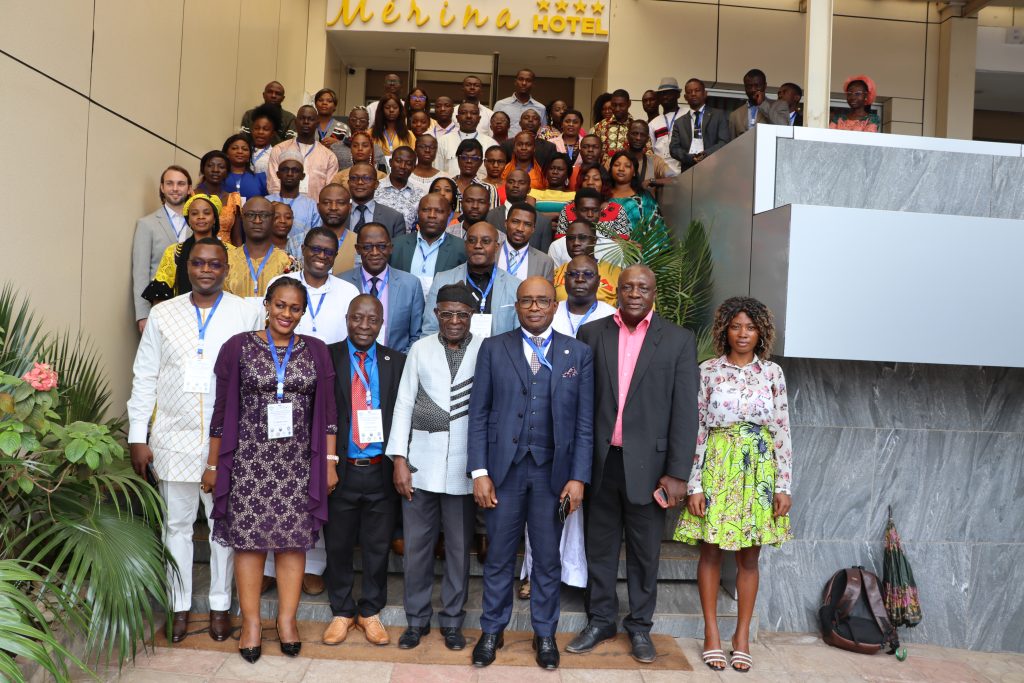Category: Uncategorized
International Seminar on Land Governance in Africa and Launch of the NELGA Central Africa Alumni Network
The Network of Excellence on Land Governance in Africa (NELGA) conducted the International Seminar on Land Governance in Africa, alongside the launch of the NELGA Central Africa Alumni Network. This event, hosted by the Association of Young Experts on Land Issues (AJEF) and the University of Yaoundé I, with support from the GIZ-SLGA Programme through the Network of Excellence on Land Governance in Africa NELGA, took place from June 18 to 20, 2024, both online and in Yaoundé.
NELGA, dedicated to research and capacity building, supports students and young researchers in the land sector through scholarships, fellowships, and improved education. To enhance this support, the alumni network aims to foster connections, circulate job and funding opportunities, provide mentorship, and strengthen NELGA both regionally and continentally.
The NELGA alumni, comprising graduates, program beneficiaries, and NELGA DAAD scholars, are essential for the network’s sustained impact. Their participation is crucial for advancing training, promoting research, and strengthening regional collaboration in land governance.
The seminar featured workshops and interactive sessions focused on effectively leveraging alumni contributions. The outcomes included a clear understanding of the alumni’s role in NELGA’s sustainability, a structured network for ongoing engagement, and actionable strategies for utilizing alumni expertise.
NELGA through alumni experience aims to address land governance challenges, fostering sustainable development and social justice. This transformative event empowered the next generation of land governance leaders and created a more connected and resilient NELGA community.
Call for Papers: Special Issue on “Climate Change and Land Governance” by AJLP&GS
The African Journal on Land Policy & Geospatial Sciences (AJLP&GS) is thrilled to announce an open call for contributions to its upcoming special issue on “Climate Change and Land Governance,” to be published in October 2024. This special issue aims to provide a platform for researchers to disseminate their findings and contribute to the growing body of knowledge on the intersection of climate change and land governance, targeting African and global scientific communities.
The scope of the special issue encompasses a broad range of topics, including but not limited to land use planning, climate change adaptation and mitigation strategies, forest governance, urban planning, nature-based solutions for climate resilience, and policy frameworks integrating climate change into land governance. This is a unique opportunity for researchers to highlight the critical role of land governance in addressing climate change challenges.
Key dates for this call include the submission deadline on August 25, 2024, with the peer review process from August 25 to October 10, 2024. The final camera-ready submission is due by October 20, 2024, and the publication date is set for October 31, 2024.
Researchers interested in contributing should submit their manuscripts to Guest Editor Patrick Opoku at patrick.opoku@knust.edu.gh with a copy to the Editor-In-Chief at nelga@iav.ac.ma.
To read more and apply please visit https://revues.imist.ma/index.php/AJLP-GS/announcement/view/92
Empowering Botswana’s Land Management with NELGA’s Support!
The Ministry of Lands and Water Affairs (MLWA) of Botswana, supported by the Network of Excellence on Land Governance in Africa (NELGA) and the Deutsche Gesellschaft für Internationale Zusammenarbeit (GIZ), has made significant progress in developing a comprehensive Land Management Strategy (LMS). Between March 17 and May 30, 2024, the ministry conducted a series of stakeholder engagement workshops nationwide to gather insights and foster collaboration.
These workshops, part of the ‘Strengthening Advisory Capacities for Land Governance in Africa (SLGA)’ program, aimed to create an inclusive platform for engaging multiple stakeholders on the National Land Management Strategy. Key objectives included introducing stakeholders to the draft LMS, gathering feedback, and conducting an initial assessment of land management processes in Botswana.
NELGA played a crucial role in facilitating these engagements, leveraging its expertise to ensure a thorough understanding of the needs and challenges faced by different stakeholders. Participants included government officials, local authorities, community leaders, and representatives from various sectors, ensuring a comprehensive approach to developing an effective LMS.
Highlights from these workshops included presentations by key figures such as Dr. Wordsworth Odame Larbi and Mr. Loyd Sungirirai, as well as active participation from local community leaders. These discussions highlighted the importance of collaborative approaches to land governance.
As development of the LMS continues, insights and feedback from these engagements will help shape a strategy that promotes sustainable and equitable land management in Botswana.
MOOC on Land Conflict Management Launched on Atingi
Addressing the challenges of land conflicts, the Network of Excellence on Land Governance in Africa NELGA has launched a Massive Open Online Course (MOOC) on Land Conflict Management. Developed by the University of Yaoundé I (UYI) in collaboration with the Agence Universitaire de la Francophonie (AUF) and GIZ, the course equips learners with tools to tackle land conflicts effectively.
The MOOC is structured around five modules: an introduction to land conflict management, the foundations and consequences of land conflicts, typologies and manifestations of land conflicts in Central Africa, prevention of land conflicts, and resolution of land conflicts. By the end of the course, participants will gain a deep understanding of land conflicts and practical strategies for preventing and resolving them.
The course is hosted on the Atingi platform – a user-friendly interface. The self-paced format is designed for professionals, students, and stakeholders in land governance, making it accessible to all.
If you complete the course, you will earn a certificate of completion from NELGA, enhancing your credentials and career prospects. Additionally, the course fosters a community of learners and experts dedicated to addressing real-world challenges in land governance through online workshops and continuous engagement.
Join the learning journey with Atingi’s MOOC on Land Conflict Management. Register today on LandConflict | atingi and become a leader in land governance.
For more information and to access the course, visit LandConflict | atingi. Join our growing community of learners and make a lasting impact on land governance in Central Africa.
Enhancing Sustainable Land Governance: NELGA’s Collaboration with PLAAS
As the Strengthening Advisory Capacities for Land Governance in Africa (SLGA) program approaches its conclusion in 2026, its incredible impact on people’s lives was illuminated during the SLGA/NELGA team’s visit to the Institute for Poverty, Land and Agrarian Studies (PLAAS) in Cape Town, South Africa.
The visit entailed a detailed discussion about PLAAS’s sustainability strategies and comprehensive work plan for 2024 and provided detailed perspectives on its collaboration with GIZ and the African Land Policy Centre.
The significance of PLAAS’s role within NELGA as a technical node and its contributions to self-sustainability and regional development was driven home by two colleagues who directly benefited from PLAAS’s research.
Malany Meyer, a community-based activist who works with PLAAS, is from one of Cape Town’s largest and most impoverished townships, Lavender Hill. She recounted her experience of being evicted from her home, retelling her terrifying story of finding her daughter through the dust after a combative confrontation with eviction teams. Malany had initially thought her daughter was away from the vicinity when it happened.
Sandiso Kraai, a graduate of PLAAS’s unique Postgraduate Diploma in Poverty, Land and Agrarian Studies, the only such course in Southern Africa, gave an impassioned rendition of his time in the programme. As a member of the government and on the opposing side of communities where he has to evict people and face those like Malany – often where his family members live – he said the teachings gave him the language to express himself and the complexity he deals with daily, which made him into a more understanding public servant.
While the SLGA program is coming to an end, the collaboration with PLAAS remains steadfast. PLAAS’s presentation of its strategy and shared lessons provided invaluable guidance in navigating the extrication process.
Community of Practitioners in Land Management (COPRAF) Inaugurated in Senegal
In a big move for land governance in Senegal, the first Community of Practitioners in Land Management (COPRAF) was officially launched on January 26th and 27th, 2024. This initiative creates smooth professional relations among land practitioners for ongoing progress, knowledge exchange, and the refinement of tools and governance mechanisms. The establishment of COPRAF aims to strategically enhance land management practices.
COPRAF’s inception comes in response to the operational challenges preceding legal frameworks in land reforms. This initiative signifies an opportunity to address operational shortcomings, strengthen observed successes, and pave the way for the expansion of pilot projects.
The project Strengthening Land Governance for Africa (SLGA) – Sénégal Country Package supported the establishment of COPRAF aiming to influence policy decisions and improve the institutional and legal framework of land management in Senegal.
Members of the network have access to specialised resources, training and events that allow them to fuel the development of Senegalese skills in the complex treatment of a land issue with delicate societal issues.
As COPRAF takes its first steps to enhance land governance in Senegal, it stands as a significant step towards collaborative efforts and sustainable land management practices in the region.
NELGA and Cameroon Land-Related Institutions Join Forces to Enhance Land Governance Capacity
A significant obstacle in Africa has been the lack of human and institutional capacity to implement sustainable land policies. This has impacted numerous land administration and management facets, including surveying, land use planning, land titling, and cadaster. The insufficient quality of academic programmes in African universities and institutions of higher education is one of the primary causes of this issue. In addition, most nations lack the capacity for applied research, monitoring, and evaluation and the data required for effective land policy implementation.
The African Land Policy Centre (ALPC) established the Network of Excellence on Land Governance in Africa (NELGA) to address these issues. NELGA is a partnership between African universities and research institutions that have demonstrated leadership in land governance education, training, and research. The NELGA seeks to improve land governance training opportunities and curricula, promote demand-driven research on land policy issues, connect scholars and researchers across Africa through academic networks, and generate data and information for monitoring and evaluating land policy reforms.
To ensure better coordination of NELGA across the continent, a lead university has been chosen for each AU region; these universities are known as “regional nodes.” The University of Yaoundé 1 has been chosen to facilitate and coordinate the implementation of NELGA activities in Central Africa.
In October 2022, a workshop on evaluation and planning was held in Douala, Cameroon, to assess the quantity and quality of land-related training and the institutional and human competencies of higher education institutions working on land issues. The workshop’s objective was to ensure that land governance is incorporated into land-related training courses and that practitioners and decision-makers have a deeper understanding of land governance.
During the workshop, it became apparent that land-related institutions were not significantly associated with or engaged in NELGA’s activities. To foster knowledge development and sharing, capacity development of land-related institutions, research-policy dialogue, improvement of decision-making processes based on research findings, and the overall improvement of land policy at the continental and national level, it was necessary to increase the involvement of land practitioners working in governmental and non-governmental institutions.
To accomplish this goal, a two-day workshop will be conducted in Yaounde on May 28 and 29, 2023. The workshop aims to bring together land-related institutions operating at the national level in Cameroon to share information about NELGA, collect their needs in capacity and institutional development, design relative focal points, explore means of collaboration from central to regional levels, explore means and axes of collaboration between these institutions and NELGA, and develop a working plan.
After the workshop, land-related institutions should thoroughly understand NELGA’s activities, goals, and vision on a national and regional scale. Their needs in terms of capacity-building and development will be gathered, and a strategy for their implementation will be implemented. The focal points will be identified, their duties and responsibilities will be clarified and consolidated, and an MOU draught will be available for review. Overall, it is anticipated that the workshop will increase the participation of land practitioners in NELGA’s activities, which will contribute to developing national and continental land policy.
NELGA Researchers in Southern Africa Master the Art of Scientific Writing
Scientific writing is important in the development of academia and academic institutions. It is a challenge for postgraduate students and lecturers (supervisors) to write scientific papers, especially for publication in high impact scientific journals. Academics and postgraduate students have found it difficult to develop their scientific writing skills to meet the publication requirements of high impact journals. Lecturers who supervise postgraduate candidates face the daunting task of transferring quality scientific writing skills to the students since writing at postgraduate level is complex. Therefore, strengthening the capacity of lecturers to transfer scientific writing skills effectively improves graduation rates and academic publications.
In an attempt to a Scientific Writers’ workshop was held back in October 2022 at Chaminuka Lodge and Nature Reserves in Lusaka, Zambia. The objectives of the workshop are as follows; i) Improve the quality of scientific writing skills. ii) Assist early researchers working on scientific papers to produce publishable papers. iii) Increase research collaboration among NELGA member Universities and iv) Strengthen research supervision and mentorship skills of academic staff supervising postgraduate students.
The Workshop was a collaboration among Namibian University of Science and Technology (NUST), Network for Land Governance in Africa (NELGA), University of Zambia, and sponsored by GIZ. The University of Zambia hosted the workshop, facilitated by four consultants: Professor Chigbu (Namibia), Professor Chakwizira (South Africa), Dr Pamela Duran Diaz (Germany), and Dr Chavunduka (Zimbabwe). The consultants led each of the sessions that focused on a specific aspect of scientific writing. The areas covered included: H-index and Social Impact factors in scientific academic publication; Strategies of scientific writing skills; Comparing different styles of scientific writing; Conducting effective literature review; Writing scientific articles; Publishing articles in high-ranking journals; Strategies of scientific writing skills; Comparing different styles of scientific writing; Tips on PhD Discourse.
Ten (10) PhD students and one (1) Masters Student registered at various universities also presented summaries of their research papers. Supervisors gave feedback to the students and identified areas of improvement. The main outputs of the workshop included the identification of the members of team to spearhead the development of a scientific writer’/supervisors’ manual. Secondly, the submission of abstracts from each of the participants as a contribution as a chapter a book that will be edited and published.
Stakeholders in the Land Sector Validate the NELGA Strategy
Addis Ababa, November 23, 2022 (ECA): Land stakeholders in Africa, through the support of the Africa Land Policy Centre at the United Nations Economic Commission for Africa (ECA), held a validation workshop on the Network of Excellence on Land Governance in Africa (NELGA) strategy for 2023 – 2027. The five-year plan provides a road map to drive NELGA’s operations and programming on the AU Agenda on Land and ensure the network’s sustainability.
The NELGA strategy identifies priority actions and measures to ensure adequate implementation of its programming areas, increase knowledge exchange and communication, and improve, scale up and coordinate sustainable actions among network research areas in policy spaces.
The strategy was developed through an inclusive, consultative and participatory approach with NELGA members, government and land stakeholders. Joan Kagwanja, Coordinator of the ALPC at ECA, applauded the existence of the strategy, which guides the network to document and maximize positive land administrative systems for Africa. She shared that the document serves as a crucial execution tool for NELGA to identify and implement programming actions that address various land challenges and thereby contribute to an improved land governance landscape in Africa.
The strategy was developed with technical support from ECA and funded by the German Development Cooperation.
NELGA Looks into Cameroon Land-Labour Market
Investigates New Ways to Connect New Land Graduates to the Labour Market
“African problems require African solutions. Academic skills, industry needs and employment realities must be in sync and supported by relevant land policies or economic frameworks which jointly support the development of our region.”
Rose Chindji, NELGA Support Coordinator and Researcher at the University of Yaounde 1
The workshop on Land-related Labour Market organised by the Network of Excellence on Land Governance in Africa (NELGA), Central Africa hub in Cameroon, kicked off in Yaoundé on October 21 with a definite call for African countries to develop a road map on the integration of land professionals into the workforce, and inclusive land employment mechanisms, especially for women and youth.
” Many Africans with advanced qualifications find that their university degrees are simply not enough to land a job in the market. We need commitment from our tertiary and government bodies to ensure the eradication of divergence between labour market needs and skills of graduates in Africa,” Cameroons Commissioner of Environment and Nature Protection, Paul Tchawa told participants at the workshop held in Yaoundé. Tchawa said that “working on land and employment requires collaboration with all stakeholders to reflect on how to bridge the gap between the needs of employers in the land sector and the skillset and knowledge graduates acquire during their studies.”
The convergence, which focuses on the land-labour market challenges for young graduates, is hosted by the University of Yaoundé 1, NELGA’s regional hub for the region, with the support of the Federal Ministry for Economic Cooperation and Development (BMZ) and the German Development Cooperation (GIZ). The African Center for Economic Transformation reveals that nearly 50% of current university graduates in Africa do not find jobs and the continent is expected to absorb 122 million new entrants to the labour force during this decade. African education systems have been oriented towards obtaining a qualification rather than acquiring skills and competencies to promote successful integration into work.
Representatives from the government of Cameroon, land researchers and stakeholders discussed strategies to reduce the mismatch between the labour market needs and skills of many land graduates in Africa. NELGA’s Programme Manager, Desire Tchigankong, explains that the mismatch between the labour market needs and skills of many graduates in Africa is highlighted by the GIZ-Strengthening Advisory Capacities for Land Governance in Africa (SLGA). “To meet the requirements of the employing organisations, students must acquire the relevant knowledge and skills to effectively contribute to better land governance systems and economic development,” explains Tchigankong.
Participants discussed and designed a roadmap for Cameroon to improve employment quota in the land-labour market, especially for women and the youth, and improve land industry labour integration in the Central Africa region.
